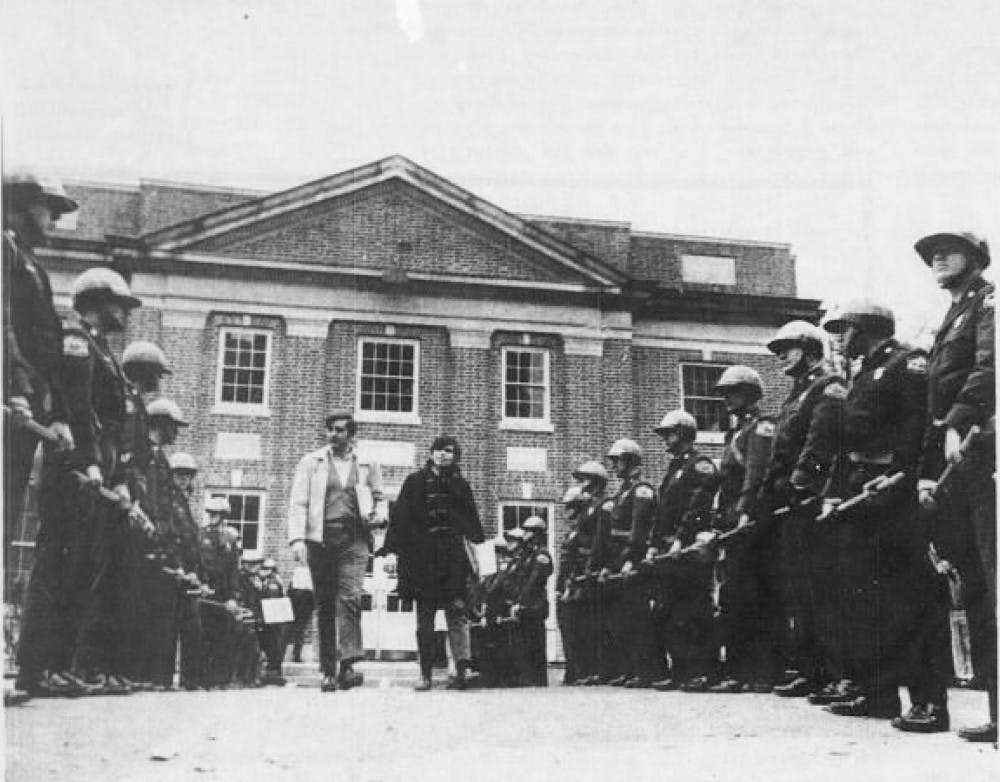“Early on, very early on in its tenure, the student leaders in the Black Student Movement were engaged in advocating for African-American workers on campus,” Graham said.
A core group of food workers, led by employees Mary Smith and Elizabeth Brooks, joined forces with BSM leader Preston Dobbins and planned the Feb. 23 demonstration. In the days following the demonstration, students stood outside Lenoir distributing pamphlets about the strike.
Because it was unoccupied at the time, Manning Hall was transformed into a temporary dining hall called the Soul Food Cafeteria where strikers served meals to students boycotting Lenoir.
In early March, after UNC Chancellor Carlyle Sitterson refused to meet with workers because of student involvement in the strike, protesters took a different approach.
Strike-supporting students entered Lenoir and took their places in the serving lines among their classmates. They proceeded to purposefully slow down the service provided by the few remaining workers and took up entire tables with nothing in hand but a glass of water.
On March 4, 1969, the strike gained the attention of North Carolina’s Gov. Robert Scott.
“A scuffle broke out (in Lenoir) and many of the student protesters overturned tables,” Graham said. “This was portrayed by some media as a kind of a riot, or a more violent outburst. The reaction around the state was pretty angry from a lot of people.”
In an attempt to keep Lenoir from closing, Scott sent five units of riot-trained Highway Patrol officers to the campus and announced that the National Guard was standing by in Durham.
But rather than quell the situation, the Governor’s intervention prompted more students and faculty members to become active in the protest.
Following Scott’s actions, the food workers formed the UNC Non-Academic Employees Union. The union’s requests included a $1.80 per hour minimum wage (approximately $12.47 in 2018), the appointment of a Black supervisor and adequate pay for overtime work.
Scott agreed to the demand of a wage increase and the strike ended on March 21, 1969.
“(The strike was) something that did not happen just out of the blue here at UNC,” North Carolina Collection gallery keeper Linda Jacobson said. “It was something that was going on across the South and it was part of a bigger movement by African-American workers across the South who were striking for better wages, and it was happening right in the midst of all that.”
To get the day's news and headlines in your inbox each morning, sign up for our email newsletters.
Although Scott agreed to provide higher wages and better working conditions for UNC’s non-academic employees, the food workers struggle for fair treatment did not end there.
In May 1969, UNC ceased University-operated dining services and entered into a contract with a company called SAGA Food Services. On Nov. 7, after SAGA issued layoffs and some of the Governor’s promises for better working conditions were still unfulfilled, 250 of UNC’s 275 food workers declared a second strike.
The second strike showed similar patterns as the first. It was centered on justice for Black non-academic employees and included significant involvement from students and faculty. UNC’s BSM told SAGA they planned to hold a protest in the Pit on Dec. 8 if working conditions were not improved.
The second strike ended on Dec. 9, 1969 after an agreement was signed between SAGA and union representatives. In January 1970, SAGA announced they would not renew their dining contract with the University.
In honor of the 50th anniversary of the strikes, University Libraries has curated a special exhibit titled “Service, Not Servitude: The 1969 Food Workers’ Strikes at UNC-Chapel Hill.” Located in Wilson Library, the exhibit is free and will be open to the public until May 31.
On March 20, the PlayMakers Repertory Company will perform “Voices from the Archives: The 1969 UNC Food Workers’ Strike.” The performance will take place in Wilson Library’s Pleasant Family Assembly Room and is free to the public.
Graham said he thinks this is an important moment in the history of the University and it laid the groundwork for future protests and advocacy by campus workers.
“We're especially excited to have this opportunity to talk about the work on campus that may often go unseen and unheralded,” he said.
@arabellasau
university@dailytarheel.com




